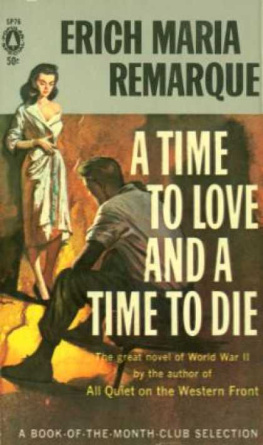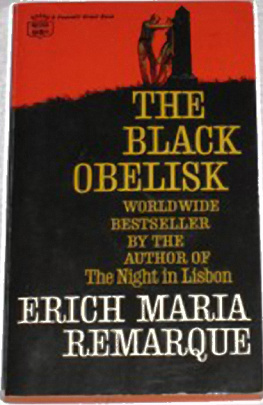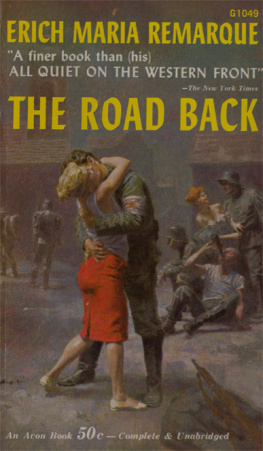ErichRemarque - All Quiet On The Western Front
ONE
Weare at rest five miles behind the front. Yesterday we were relieved,and now our bellies are full of beef and haricot beans. We aresatisfied and at peace. Each man has another mess-tin full for theevening; and, what is more, there is a double ration of sausage andbread. That puts a man in fine trim. We have not had such luck asthis for a long time. The cook with his carroty head is begging us toeat; he beckons with his ladle to every one that passes, and spoonshim out a great dollop. He does not see how he can empty his stew-potin time for coffee. Tjaden and Mller have produced twowashbasins and had them filled up to the brim as a reserve. In Tjadenthis is voracity, in Mller it is foresight. Where Tjaden putsit all is a mystery, for he is and always will be as thin as a rake.What's more important still is the issue of a double ration ofsmokes. Ten cigars, twenty cigarettes, and two quids of chew per man;now that is decent. I have exchanged my chewing tobacco withKatczinsky for his cigarettes, which means I have forty altogether.That's enough for a day.
Itis true we have no right to this windfall. The Prussian is not sogenerous. We have only a miscalculation to thank for it. Fourteendays ago we had to go up and relieve the front line. It was fairlyquiet on our sector, so the quartermaster who remained in the rearhad requisitioned the usual quantity of rations and provided for thefull company of one hundred and fifty men. But on the last day anastonishing number of English heavies opened up on us withhigh-explosive, drumming ceaselessly on our position, so that wesuffered severely and came back only eighty strong.
Lastnight we moved back and settled down to get a good sleep for once:Katczinsky is right when he says it would not be such a bad war ifonly one could get a little more sleep. In the line we have had nextto none, and fourteen days is a long time at one stretch.
Itwas noon before the first of us crawled out of our quarters. Half anhour later every man had his mess-tin and we gathered at thecookhouse, which smelt greasy and nourishing. At the head of thequeue of course were the hungriest-little Albert Kropp, the clearestthinker among us and therefore only a lance-corporal; Mller,who still carries his school textbooks with him, dreams ofexaminations, and during a bombardment mutters propositions inphysics; Leer, who wears a full beard and has a preference for thegirls from officers' brothels. He swears that they are obliged by anarmy order to wear silk chemises and to bathe before entertainingguests of the rank of captain and upwards. And as the fourth, myself,Paul Baumer. And four are nineteen years of age, and all four joinedup from the same class as volunteers for the war.
Closebehind us were our friends: Tjaden, a skinny locksmith of our ownage, the biggest eater of the company. He sits down to eat as thin asa grasshopper and gets up as big as a bug in the family way; HaieWesthus, of the same age, a peat-digger, who can easily hold aration-loaf in his hand and say: Guess what I've got in my fist; thenDetering, a peasant, who thinks of nothing but his farm-yard and hiswife; and finally Stanislaus Katczinsky, the leader of our group,shrewd, cunning, and hard-bitten, forty years of age, with a face ofthe soil, blue eyes, bent shoulders, and a remarkable nose for dirtyweather, good food, and soft jobs.
Ourgang formed the head of the queue before the cook-house. We weregrowing impatient, for the cook paid no attention to us. FinallyKatczinsky called to him: "Say, Heinrich, open up thesoupkitchen.
Anyonecan see the beans are done."
Heshook his head sleepily: "You must all be there first."Tjaden grinned: "We are all here."
Thesergeant-cook still took no notice. "That may do for you,"he said.
"Butwhere are the others?"
"Theywon't be fed by you to-day. They're either in the dressing-station orpushing up daisies." The cook was quite disconcerted as thefacts dawned
onhim. He was staggered. "And I have cooked for one hundred andfifty men--"
Kropppoked him in the ribs. "Then for once we'll have enough. Comeon, begin!"
Suddenlya vision came over Tjaden. His sharp, mousy features began to shine,his eyes grew small with cunning, his jaws twitched, and he whisperedhoarsely: "Man! then you've got bread for one hundred and fiftymen too, eh?"
Thesergeant-cook nodded absent-minded, and bewildered.
Tjadenseized him by the tunic. "And sausage?"
Gingernodded again.
Tjaden'schaps quivered. "Tobacco too?"
"Yes,everything."
Tjadenbeamed: "What a bean-feast! That's all for us! Each man gets-wait a bit-yes, practically two issues."
ThenGinger stirred himself and said: "That won't do."
Wegot excited and began to crowd around.
"Whywon't that do, you old carrot?" demanded Katczinsky.
"Eightymen can't have what is meant for a hundred and fifty."
"We'llsoon show you," growled Mller.
"Idon't care about the stew, but I can only issue rations for eightymen," persisted Ginger.
Katczinskygot angry. "You might be generous for once. You haven't drawnfood for eighty men. You've drawn it for the Second Company. Good. Let's have it then. We are the Second Company." We began tojostle the fellow. No one felt kindly toward him, for it was hisfault that the food often came up to us in the line too late andcold. Under shellfire he wouldn't bring his kitchen up near enough,so that our soup-carriers had to go much farther than those of theother companies. Now Bulcke of the First Company is a much betterfellow. He is as fat as a hamster in winter, but he trundles his potswhen it comes to that right up to the very front-line. We were injust the right mood, and there would certainly have been a dust-up ifour company commander had not appeared. He informed himself of thedispute, and only remarked: "Yes, we did have heavy lossesyesterday." He glanced into the dixie. "The beans lookgood." Ginger nodded. "Cooked with meat and fat." Thelieutenant looked at us. He knew what we were thinking. And he knewmany other things too, because he came to the company as a non-com,and was promoted from the ranks. He lifted the lid from the dixieagain and sniffed. Then passing on he said: "Bring me a platefull. Serve out all the rations. We can do with them." Gingerlooked sheepish as Tjaden danced round him. "It doesn't costyou anything! Anyone would think the quartermaster's store belongedto him! And now get on with it, you old blubber-sticker, and don'tyou miscount either."
"Yoube hanged!" spat out Ginger. When things get beyond him hethrows up the sponge altogether; he just goes to pieces. And as if toshow that all things were equal to him, of his own free will heissued in addition half a pound of synthetic honey to each man.
To-dayis wonderfully good. The mail has come, and almost every man has afew letters and papers. We stroll over to the meadow behind thebillets. Kropp has the round lid of a margarine tub under his arm. On the right side of the meadow a large common latrine has beenbuilt, a roofed and durable construction. But that is for recruitswho as yet have not learned how to make the most of whatever comestheir way. We want something better. Scattered about everywhere thereare separate, individual boxes for the same purpose. They are square,neat boxes with wooden sides all round, and have unimpeachablysatisfactory seats. On the sides are hand grips enabling one to shiftthem about.
Wemove three together in a ring and sit down comfortably. And it willbe two hours before we get up again.
Iwell remembered how embarrassed we were as recruits in barracks whenwe had to use the general latrine. There were no doors and twenty mensat side by side as in a railway carriage, so that they could bereviewed all at one glance, for soldiers must always be undersupervision. Since then we have learned better than to be shy aboutsuch trifling immodesties. In time things far worse than that cameeasy to us. Here in the open air though, the business is entirely apleasure. I no longer understand why we should always have shied atthese things before. They are, in fact, just as natural as eatingand drinking. We might perhaps have paid no particular attention tothem had they not figured so large in our experience, nor been suchnovelties to our minds-to the old hands they had long been a merematter of course.
Next page









